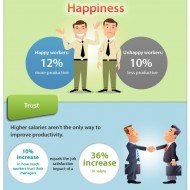Posted by Managementguru in Business Management, Decision Making, Human Resource, Leadership, Organisational behaviour, Training & Development
on May 18th, 2016 | 0 comments

Managing people require a completely different skill set than managing tasks. The transition from being an individual contributor to someone responsible for the work of others and team performance results in a steep learning curve. Learn how to motivate, delegate, communicate and lead. Play to your strengths and improve on key weakness areas. With an emphasis on building high achieving teams, dealing with an increased workload and developing the influence, assertiveness and confidence necessary to be an effective manager or supervisor – this course will ensure you hit the ground running.

Posted by Managementguru in How To, Human Resource, Strategy, Stress Management, Time Management, Training & Development
on Sep 15th, 2015 | 0 comments

Work Can be Play – How to Overcome Burnout? Let me Start With Some Quotes to Motivate You: “There are no secrets to success; it is the result of preparation, hard work and learning from failure.” “Falling down is how we grow. Staying down is how we die.” “Success is going from failure to failure without losing your enthusiasm.” “You must be the change you wish to see in the world. “Keep your face to the sunshine and you can never see the shadow.” Strategy of Smart Work I would like to suggest a few ways as to “How to improve your efficiency and quality of your work” without feeling the pinch. You don’t need to put in enormous hours of work to prove your mettle as it might only make you more exhausted and drain you of your physical and mental stamina. When we’re working hard, other areas of our life get neglected: Maybe you’re working long hours but eating poorly and never exercising. It might not seem like such a bad choice now, but when you run into health problems a few years down the road, you’re going to wish you’d found a better balance. Working too hard can have a really negative effect on your quality of life, too. Long hours and the pressure to keep doing more can lead to stress, burn out, depression, or just that miserable feeling of is this all there is to life? So how can you get away from the mindset of working hard and start working smart? Every 20 minutes take a break – Getting up to have a coffee or some water will make you feel agile. This suits well for the desk potatoes who are wedded to the computers. Prioritize the issues to be sorted out that particular day and focus your attention only on those issues until they are solved. This acts as a positive reinforcer and prepares you for the next challenge. If you find yourself with an excuse not to do it, tell yourself “Do it now”. “First Things First” is one of Stephen Covey’s “7 Habits” in 7 Habits of Highly Effective People. It means taking care of the most important things in your life before turning to the rest. Rather than trying to do everything at once, pick one or two key goals for each year, and focus wholeheartedly on those. It’s much better to actually accomplish a dream than to have a vague stab at lots of different things … only to end up making very little progress. Info: Pickthebrain.com Learn to say “NO” However, you can easily take it too far. At some point, you need to learn to decline opportunities. Your objective should be to take on only those commitments that you know you have time for and that you truly care about. Sleep at least 7-8 hours. Most people need 7-8 hours of sleep for their bodies and minds to function optimally. You know if you’re getting enough. Listen to your body, and don’t underestimate the value of sleep. Devote your entire focus to the task at hand. Close out all other browser windows. Put your phone away, out of sight and on silent. Find a quiet place to work, or listen to some music if that helps you. Exercise and eat healthy Numerous studies have linked a healthy lifestyle with work productivity. Similar to getting enough sleep, exercising and eating healthily boost energy levels, clear your mind, and allow you to focus more easily. Delineate a time limit in which to complete task. Instead of just sitting down to work on a project and...

Posted by Managementguru in Economics, Financial Management, How To, Human Resource, Operations Management, Training & Development
on Mar 15th, 2015 | 0 comments

Productivity Analysis: Productivity is defined in terms of utilization of resources, like material and labor or it is the ratio of output to input. For example, productivity of labor can be measured as units produced per labor hour worked. It is closely associated with quality, technology and profitability. Now you will be able to understand why there is a strong emphasis on productivity improvement in a competitive business environment. It can be calculated at firm level, at industry level, at national level and at international level. That is what we call as GDP, NDP, and PPP. Gross Domestic Product – ‘GDP’: The monetary value of all the finished goods and services produced within a country’s borders in a specific time period, though GDP is usually calculated on an annual basis. Net Domestic Product – ‘NDP’: An annual measure of the economic output of a nation that is adjusted to account for depreciation, calculated by subtracting depreciation from the gross domestic product (GDP). Purchasing Power Parity – ‘PPP’: An economic theory that estimates the amount of adjustment needed on the exchange rate between countries in order for the exchange to be equivalent to each currency’s purchasing power. Efficiency can be improved by (a) Controlling inputs, (b) Improving process so that the same input yields higher output, and (c) By improvement of technology. Factor Productivity: When it is measured individually for each input resource to the production process it is called factor or partial productivity. Total Productivity: When it is measured for all the factors of production together, it is called total factor productivity. What are the types of Productivity Analysis? 1. Trend analysis: Studying productivity changes for the firm over a period of time. 2. Horizontal analysis: Studying efficiency in comparison with other firms of same size and involved in similar business. 3. Vertical analysis: Studying output in comparison with other industries and other firms of different sizes in the same industry. 4. Budgetary analysis: Setting up a norm for productivity for a future period as budget and planning strategies to achieve it. FACTORS AFFECTING PRODUCTIVITY 1. Capital/labor ratio: It is a measure of whether enough investment is being made in plant, machinery, and tools to make effective use of labor hours. 2. Scarcity of some resources: Resources such as energy, water and number of metals will create problems. 3. Work-force changes: Change in work-force affect productivity to a larger extent, because of the labor turnover. 4. Innovations and technology: This is the major cause of increasing productivity problems. 5. Regulatory effects: These impose substantial limitations on some firms. 6. Bargaining power: Bargaining power of organized labor to command wage has a detrimental effect. 7. Managerial factors: The planning and strategic skills of a manager play a big role in boosting the productivity of an organization. 8. Quality of work life: It is a term that describes the organizational culture, and the extent to which it motivates and satisfies employees. Here are the top 10 productivity killers in the workplace you’ll want to watch out for: 1. Cell phone/texting 2. Gossip 3. The internet 4. Social media 5. Snack breaks or smoke breaks 6. Noisy coworkers 7. Meetings 8. Email 9. Coworkers dropping by 10. Coworkers putting calls on...

Posted by Managementguru in Accounting, Financial Accounting, Financial Management, Management Accounting, Project Management, Training & Development
on Jan 21st, 2015 | 0 comments

What Does a Career in Accounting Demands for? Are you vying for a career in accounting field? Everybody envy accountants for there is a misconception that they are Demi-Gods. Though a good accounts manager can act like one who can save you from a dire situation by manipulating the accounts skilfully, the demands and challenges in this field are too high to be savored. Purchase Your Copy of “Careers with a Degree in Accountancy and Finance” at Gumroad So what does it take to become a reputed accounts man in your circle and also enjoy what you do! Self analysis is the best way to understand what you really want to be. There are certain traits characteristic to people belonging to this community. See if you are gifted with those attributes; if not, you can always train yourself to gain expertise. 1. Are you good at numbers– Mathematics, Yuck! If this is your reaction please quit reading this article as numbers play an integral role in accountancy. Figures, Figures and more Figures determine the profit and loss status of a company. If you are passionate about playing with numbers it goes without saying you are already a half accountant. The thrill of taking control and handling numbers make or break a company. Jackie Mansion jocularly puts it – “Did you ever hear of a kid playing accountant – even if they wanted to be one?” 2. Are you a good listener and can you read between the lines? A good auditor will allow the client to talk and listen to what he says. Then he tries to extract the exact kind of information he needs to make the ends meet. Empathy is an innate quality and if you are not going to be a good listener then please revise your consideration of becoming an accountant. Sometimes the client may not know what you wish to seek; it is your responsibility to frame simple questions in a language that he understands and pull out answers. 3. Can you avoid being temperamental? 90% of the time your clients are going to say “No” to whatever you suggest. Alas, it is not their fault; the corporate Bosses and CEO’s always aim big and most probably will not be aware of the consequences of their impulsive actions. They always think about clinching a deal and conveniently overlook the effects of their financial and corporate decisions on the account and subsequently on the accountant. For example cash has to be handled very carefully and every penny has to be accounted for properly. A bank cashier will know the importance of cash handling as it is very important for them to balance the inflow and outflow at the end of the day. For corporate firms, it becomes mandatory to reduce the cash dealings and account every transaction in the form of a check or electronic transfers like RTGS or NEFT or EFT. The point is, you should have the nerve to talk to a company’s head if he is planning for a bad move and suggest what could be done for the good of the company (Income tax and Sales purposes). 4. Are you wise when it comes to choosing clients? Whether you are a part time practitioner, Full time accountant, Accounts manager or Free lancer, do your homework before accepting the offer. Ultimately you need to see your payments coming through and nobody works here for a song. Big practitioners take a big cut half yearly or annually but if you are a part time accountant, it is always better to go for monthly payments or get paid after the completion of individual project s....

Posted by Managementguru in Human Resource, Training & Development, Video Lecturers
on Jan 13th, 2015 | 0 comments

Talent Acquisition and Compensation Benefits A lecture on Talent Acquisition and Compensation by Dr. Armin Trost Human Resource Management Lecture – Talent Acquisition What does the traditional approach in recruiting look like? How is a company able to position and present itself as an attractive place to work through building an employer brand? Which active search strategies help companies to find and approach passive candidates? How can companies retain promising and talented candidates? You Don’t Create Your Employment Brand, Your Candidates And Employees Do” – @ChiHeadhunter Talent hits a target no one else can hit; genius hits a target no one else can see. – Arthur Schopenhauer The following video lecture by Dr. Armin Trost clearly indicates his knowledge and experience on the subject. Visit this link to know more about this HR Expert- Armin Trost Human Resource Management Lecture – Candidate Selection During a company’s recruiting process how are the most suitable candidates selected and which risks need to be controlled? How can a company determine a candidate’s future performance? Which selection criteria are typically used? What are the most commonly used selection methods? Whenever you are asked if you can do a job, tell ‘em: ‘Certainly I can!’ Then get busy and find out how to do it. – Theodore Roosevelt Find out what you like doing best and get someone to pay you for doing it. – Katherine Whitehorn Human Resource Management Lecture – Compensation and Benefits What is equity? Which components make up total reward and based on which factors are these components determined? How does fixed and variable pay work in practice? What are benefits and why are they there? Under which conditions does money impact motivation for performance? Strive not to be a success, but rather to be of value. – Albert Einstein The mind is everything. What you think you become. – Buddha Related Videos: HRM Video 1 HRM Video...










